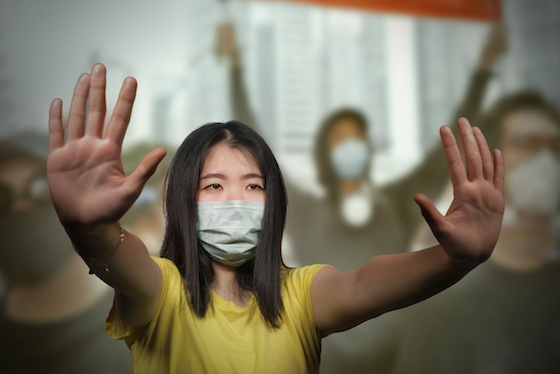Hoteliers in Hong Kong, rocked by unprecedented protests, had little to cheer about this past holiday season. Most had a wish list that the protests would die down by the year’s end and that tourism finally might rebound.
But December figures showed occupancy and room rates continued their lengthy decline since unrest ignited in the former British colony early last year. Add to that, the coronavirus outbreak in January, which has further impacted fundamentals.
“December showed no signs of coming back,” said Jesper Palmqvist, area director Asia Pacific for STR. “In fact, it was the worst month so far, when compared to 2018.”
Hoteliers confirmed that occupancy was steeply off what is normally a very buoyant winter period. While most said they were avoiding stiff discounting, online checks showed rooms at rates unseen in decades. STR reported occupancy levels at 65% with ADRs at HK$1,100 (US$142), both figures around 30% lower than last year.

Contributed by Ron Gluckman
Hong Kong’s economy shrunk 3.2% in the July to September period, the second consecutive quarter of decline, which is the usual definition of a recession – the first for Hong Kong in a decade. On January 15, the Hong Kong Tourism Board announced visitor arrivals in 2019 of 55.9 million, a decline of 14.2% over the previous year. However, the numbers were actually up nearly 14% in the first half of the year. Arrivals declined almost 40% as protests stepped up.
Weathering the storm
Hotels have thus far escaped the pressures that have prompted the closure of some small businesses and restaurants, but many hotels confirmed rigorous belt-tightening measures, and some have been forced to cut staff.
“We’ve looked at a whole range of cost containment measures,” said Jennifer Cronin, president of the local Wharf Hotels. “Our view, as long as it doesn’t impact the guest experience, everything is on the table.” Floors have been closed when room numbers are down, saving on utility bills.
Wharf has also allowed staff to take unpaid leave. “But thus far, we haven’t had to lay off any staff,” she noted proudly. “We’ve done some creative accounting and redeployed staff.” For instance, with fewer rooms needing cleaning, some staff have shifted to other assignments in the hotel, such as the restaurants.
“We’ve viewed this as a chance to do more cross training,” she said. “We think productivity levels are improved, and loyalty to staff is an investment that will pay off long term.”
Hotels have embarked on promotional schemes, increased social media activity and leveraged customer loyalty programs. “We’ve responded to the unrest with new policies, like cancelation with full flexibility, even on the same day of booking, without charge,” says Girish Jhunjhnuwala, founder of Ovolo Hotels and chairman of Hind Group, with several properties in Hong Kong.
He also has expanded the free-night scheme. “Everyone already does the buy two nights, get the third free,” he said, “but we give you that third night whenever you want to take it. We call it Threesome.”
Jhunjhnuwala said his properties were faring well in the first half of 2019 but saw a drop of 25% from June to December. “Others are really being hit hard. No question, these are really difficult times,” he said. “The hardest thing, is nobody knows how long this unrest will last.”
Some liken the situation in Hong Kong to the SARS scare of 2003, when the mystery illness sprung up in Asia and tourism fell off the cliff. Some hoteliers take solace in noting how quickly Hong Kong recovered quickly from even worse declines after SARS.
“Performance is not as low as the SARS period,” Palmqvist agreed, noting data that showed occupancy levels tanked to less than 12% in May 2003. Local officials mounted a major revival campaign, spending heavily to reboot Hong Kong with tourist promotions that included concerts by stars such as Santana, Neil Young and the Rolling Stones (who had earlier canceled due to SARS).
Longer recovery
The spending was vast but the rebound was miraculous, with occupancy levels bouncing back from 11.8% in May to 81.3% in October 2003, Palmqvist said. Yet he cautioned that recovery now will likely take much longer.
“Most people seem to think that by Q2 we could start seeing some signs of at least slight recovery — but very few I speak to feel Q1 will turn around — so basically we’re talking at least about a year before any signs.”
Cronin said hoteliers are pulling together to do mass marketing on their own. A group of the top hotels have formed a task force to promote Hong Kong as a peaceful, fabulous destination.
“It’s really the first time the hotels have gotten together like this,” she said, adding that they are sharing contacts, mobilizing influencers and social media, and linking with Hong Kong airline Cathay Pacific for the campaign.
Robert Hecker, managing director Pacific Asia at hotel consultancy Horwath HTL, added: “I don’t think there’s much that can be done to generate demand/recovery given the unpredictability of the protest impacts. Further price declines are unlikely to motivate potential visitors who have been holding off or diverting elsewhere.”
Yet Cronin remains positive, noting how Hong Kong has always managed to defy the odds. In Chinese, she noted, the word for crisis is actually written as two characters: “danger” and “opportunity.”
